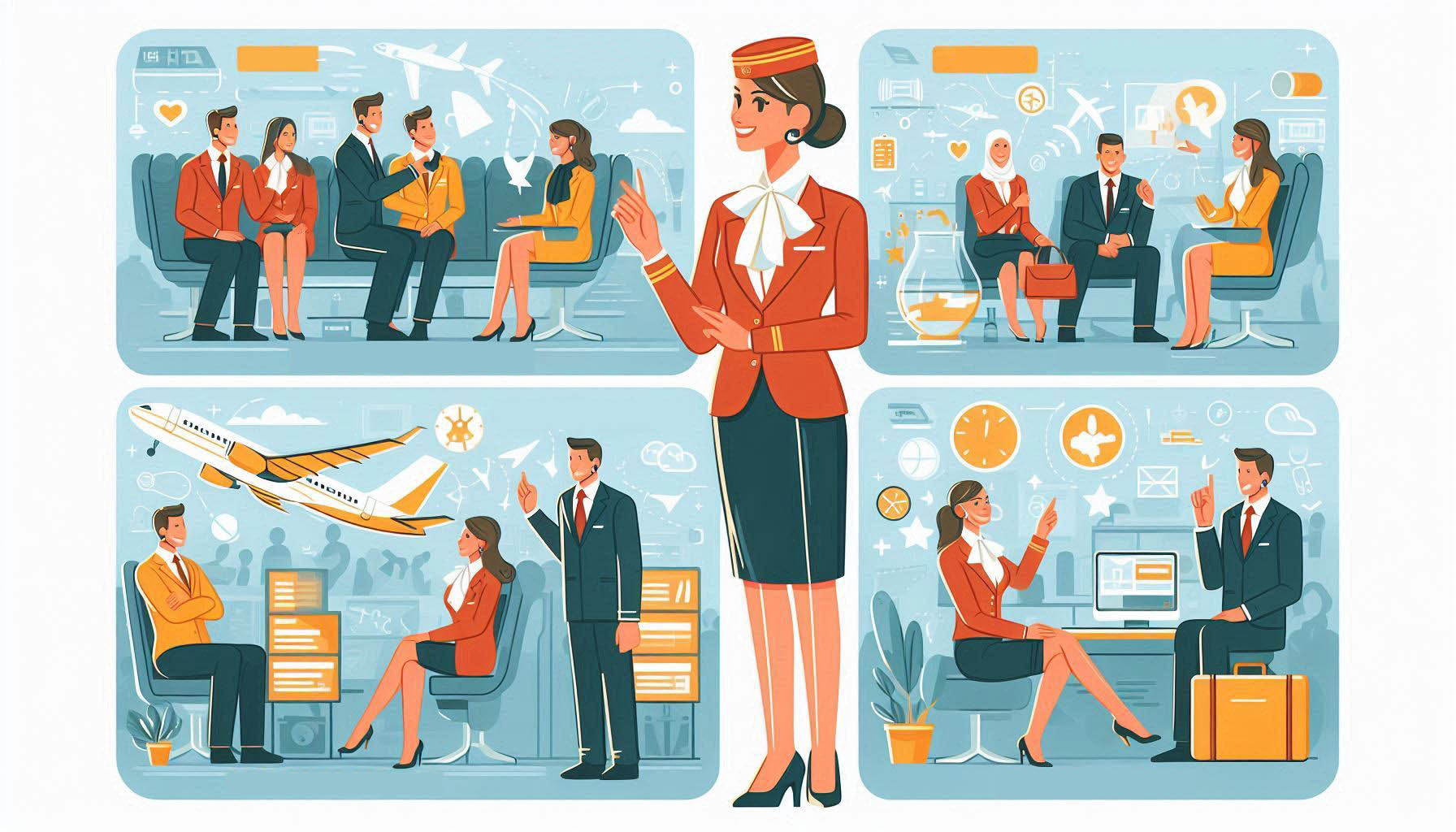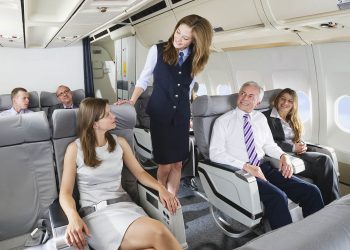Top Communication Skills Every Cabin Crew Member Should Develop
Top Communication Skills Every Cabin Crew Member Should Develop
In the aviation industry, cabin crew members are the cornerstone of a successful flight experience. Beyond ensuring safety and comfort, they play a crucial role in managing passenger needs, responding to in-flight emergencies, and maintaining an overall pleasant environment. One of the most essential tools a cabin crew member possesses is effective communication. Whether it’s giving safety instructions, addressing passenger inquiries, or resolving conflicts, strong communication skills are fundamental to providing excellent service. This article explores the top communication skills every cabin crew member should develop and how aviation training and development programs can help foster these abilities.
Why Communication Skills Matter for Cabin Crew
Effective communication is more than just the ability to speak clearly; it’s about ensuring that the message is received, understood, and acted upon appropriately. For cabin crew members, strong communication skills are crucial because:
- Safety and Compliance: Communication is at the heart of safety procedures. Cabin crew must communicate instructions clearly and effectively to passengers in emergency situations.
- Passenger Satisfaction: Cabin crew are often the first point of contact for passengers, and how they communicate can influence the passenger’s overall flight experience.
- Team Coordination: Cabin crew members work as a team, and effective communication ensures that everyone is on the same page when managing in-flight tasks or emergencies.
- Conflict Resolution: Cabin crew members must be able to communicate diplomatically to de-escalate tense situations, ensuring a smooth and respectful cabin environment.
To successfully navigate the complexities of air travel, cabin crew members need to master several communication skills, which are cultivated through aviation training and development programs.
- Clear and Concise Speech
Clarity and conciseness are the foundations of effective communication. Cabin crew members must be able to deliver critical information in a way that is easy for passengers to understand. This includes everything from explaining the safety procedures at the beginning of the flight to providing updates on delays or turbulence.
In-flight announcements need to be clear, free from jargon, and concise to ensure that passengers can absorb the essential information without feeling overwhelmed. For example, safety demonstrations should be delivered in a straightforward manner so passengers can easily follow along. Similarly, when responding to passenger inquiries, providing clear and brief answers can prevent misunderstandings and frustration.
Aviation training and development programs emphasize the importance of verbal clarity, encouraging crew members to practice speaking clearly at various volumes and speeds to suit different settings, such as in noisy cabins or over the public address system.
- Active Listening
Communication is not a one-way street. Active listening is just as crucial as speaking. Cabin crew members must be able to listen attentively to passengers’ requests, complaints, and concerns, ensuring they fully understand the issue before responding. This helps prevent misunderstandings and shows passengers that their concerns are being taken seriously.
Active listening involves more than just hearing words; it means being attentive to tone, body language, and underlying emotions. For example, if a passenger is upset, cabin crew must listen with empathy and without interruption. Acknowledge the passenger’s feelings and concerns before providing a solution or response. This creates an atmosphere of trust and respect, which is key to customer service.
In aviation training and development, active listening is often highlighted through role-playing scenarios. These exercises help crew members practice listening skills in a variety of contexts, such as responding to a distressed passenger or managing multiple requests at once.
- Non-Verbal Communication
Non-verbal communication, such as body language, facial expressions, and eye contact, plays a significant role in how messages are received. Cabin crew members often rely on non-verbal cues to assess a passenger’s mood or comfort level, especially in a noisy or crowded environment.
For instance, a friendly smile and maintaining eye contact can help establish rapport and comfort with passengers, while closed-off body language or avoiding eye contact can create distance or seem unapproachable. In emergency situations, calm and confident body language can reassure passengers and help them feel safe.
Aviation training and development programs teach cabin crew members how to utilize non-verbal communication effectively, ensuring they convey warmth, professionalism, and confidence. These skills can also be crucial when dealing with passengers who speak a different language, as body language often transcends cultural barriers.
- Empathy and Emotional Intelligence
Empathy—the ability to understand and share the feelings of others—is a critical communication skill for cabin crew members. Passengers may be experiencing anxiety, fear, or stress during a flight, whether it’s due to a fear of flying, delays, or personal issues. An empathetic response can help diffuse these emotions and create a positive environment.
For example, if a passenger is visibly nervous about turbulence, offering a kind word or reassurance can significantly alleviate their anxiety. Similarly, in situations where a passenger is upset about a delayed flight or misplaced luggage, showing understanding and offering solutions can transform a potentially negative experience into a positive one.
Aviation training and development focuses heavily on emotional intelligence and empathy. Crew members are trained to identify emotional cues and respond with care and compassion, which helps build stronger connections with passengers and contributes to overall satisfaction.
- Diplomacy and Conflict Resolution
Disagreements or misunderstandings can arise during a flight, whether it’s about seating arrangements, meal preferences, or service quality. Cabin crew members must be able to manage these situations with diplomacy and tact, ensuring that the conflict doesn’t escalate.
Being diplomatic means maintaining a neutral tone, listening to all parties involved, and offering solutions that satisfy both the passenger and the airline. For instance, if a passenger is dissatisfied with their seating, the cabin crew should address the issue calmly, apologize for the inconvenience, and offer an appropriate solution, such as relocating the passenger if possible.
Conflict resolution is an essential part of aviation training and development. Training programs typically include modules on handling difficult passengers, de-escalating heated situations, and negotiating win-win outcomes for both the passenger and the airline.
- Cultural Sensitivity in Communication
With passengers from all over the world, cultural sensitivity is a crucial skill for cabin crew members. Different cultures have varying expectations regarding communication styles, body language, and personal space. A phrase that is common and polite in one culture might be considered rude or inappropriate in another.
For example, in some cultures, direct eye contact might be seen as a sign of respect and attentiveness, while in others, it might be considered impolite or confrontational. Similarly, certain hand gestures or physical gestures may have different meanings across cultures.
Aviation training and development increasingly incorporates cultural sensitivity training, ensuring that cabin crew members understand the cultural backgrounds of passengers and adjust their communication style accordingly. This helps ensure that passengers feel respected and valued, regardless of their cultural differences.
- Clear and Effective Use of the Public Address (PA) System
Cabin crew members must be adept at using the public address (PA) system to relay important messages to passengers, whether it’s a routine announcement or an emergency instruction. Clear and effective use of the PA system is crucial in ensuring that passengers understand the information being conveyed, especially in situations that require immediate attention, such as emergency landings or safety protocols.
A well-delivered announcement can help passengers feel calm and confident, whereas a poorly delivered message may cause confusion and panic. Crew members should be trained to speak in a clear, measured, and authoritative tone while remaining polite and respectful.
Aviation training and development often includes practical sessions on PA announcements, allowing crew members to practice projecting their voice and modulating their tone to match the situation.
- Assertiveness and Confidence
While empathy and diplomacy are essential, cabin crew members must also be assertive when necessary. Assertiveness means standing firm in situations where policies or safety regulations must be followed, such as enforcing seatbelt signs or addressing safety violations. Being assertive ensures that passengers follow instructions while maintaining a respectful and professional demeanor.
Crew members who communicate assertively project confidence and authority, helping passengers feel safe and secure, particularly during emergencies.
Conclusion
Communication is one of the most valuable skills a cabin crew member can develop, as it directly impacts passenger experience, safety, and overall flight success. Mastering clear and concise speech, active listening, non-verbal communication, empathy, conflict resolution, and assertiveness are just some of the key communication skills that can help cabin crew provide exceptional service in any situation.
Through comprehensive aviation training and development programs, cabin crew members are equipped with the tools and strategies to enhance their communication skills and ensure a positive, smooth flight experience for passengers. By continually honing these skills, cabin crew members can effectively manage the demands of their role and create a welcoming environment for everyone onboard.






